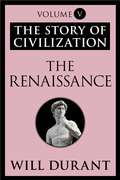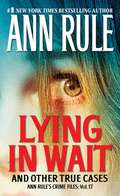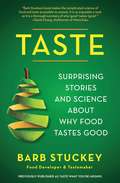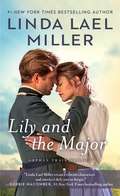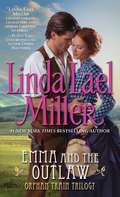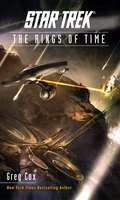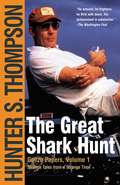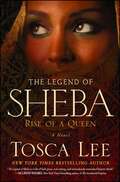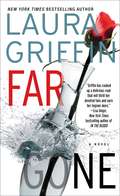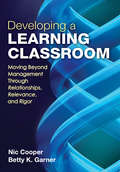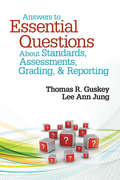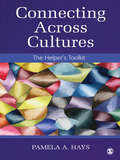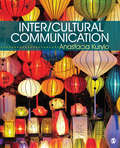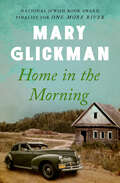- Table View
- List View
The Renaissance: The Story of Civilization, Volume V (The Story of Civilization #5)
by Will DurantThe Story of Civilization, Volume V: A history of civilization in Italy from 1304-1576. This is the fifth volume of the classic, Pulitzer Prize-winning series.
Lying in Wait: Ann Rule's Crime Files: Vol.17 (Ann Rule's Crime Files #Bk. 17)
by Ann RuleAnn Rule presents a collection of fascinating and disturbing true-crime stories—drawn from her real-life personal files—in this seventeenth volume in the #1 New York Times bestselling Crime Files series.In this gripping collection of investigative accounts from her private archives, &“America&’s best true-crime writer&” (Kirkus Reviews) exposes the most frightening aspect of the murderous mind: the waiting game. Trusted family members or strangers, these cold-blooded killers select their unsuspecting prey, wait for the perfect moment to strike, then turn normality into homicidal mayhem in a matter of moments. Ann Rule will have you seeing the people and places around you with heightened caution as you read these shattering cases, including: - New mothers murdered, their infants kidnapped, in an atrocious baby-selling scheme - The man who kept his criminal past hidden from his wife—and his wife from his mistress—until he coldly disposed of one of them - The beautiful daughter of a State Department official ran away from the privileged world she knew and hitched a ride with a man she didn&’t...with fatal consequences - For months, a vicious, rage-filled serial rapist eluded police and terrorized Seattle&’s women—when would he strike next, and how far would his violence escalate? - A criminal known for his Houdini-like escapes is serving time for murder in a botched robbery—now the convict is being served dinner in a civilian&’s home, where he has one more trick up his sleeve - A long-lost relative who came home to visit, leaving a bloody trail through Washington and Oregon; no one realized how dangerous he and his ladylove were—until it was far too late... With her ability to translate the most complex cases into storytelling &“as dramatic and chilling as a bedroom window shattering at night&” (The New York Times), Rule expertly analyzes the thoughts and deeds of the sociopath, in this seventeenth essential Crime Files volume.
Taste: Surprising Stories and Science About Why Food Tastes Good
by Barb StuckeyWhether it&’s a grilled cheese sandwich with tomato soup or a salted caramel coated in dark chocolate, you know when food tastes good—now here&’s the amazing story behind why you love some foods and can&’t tolerate others.Through fascinating stories from Barb Stuckey—a seasoned food developer to whom food companies turn for help in creating delicious new products—you&’ll learn how our five senses work together to form flavor perception and how the experience of food changes for people who have lost their sense of smell or taste. You&’ll learn why kids (and some adults) turn up their noses at Brussels sprouts, how salt makes grapefruit sweet, and why you drink your coffee black while your spouse loads it with cream and sugar. Eye-opening experiments allow you to discover your unique &“taster type&” and to learn why you react instinctively to certain foods. You&’ll improve your ability to discern flavors and devise taste combinations in your own kitchen for delectable results. What Harold McGee did for the science of cooking Barb Stuckey does for the science of eating in Taste—a calorie-free way to get more pleasure from every bite.
Lily and the Major (Orphan Train #1)
by Linda Lael MillerThe first novel in the romantic Orphan Train trilogy is a beloved historical classic about a woman who must choose between her family and her one true love—by #1 New York Times bestselling author Linda Lael Miller.In his arms, she discovered how tender—and how bold—true passion could be… Lily Chalmers wanted only two things from life—a farm of her own, and to find the sisters she hadn’t seen since they were all little girls heading West on the orphan train. She certainly had no desire for a husband. Yet proud, innocent Lily had no idea what desire meant until she met Major Caleb Halliday, a man who could ignite her very being with a single touch…a glance…a whisper. Sheltered in his arms, Lily rode the crest of a wild, helpless passion. And though she struggled against her own willful heart, she knew she could never choose between the dazzling man who had claimed her love so completely, and her bold, long-cherished dream…
Emma And The Outlaw (Orphan Train #2)
by Linda Lael MillerThe #1 New York Times bestselling author Linda Lael Miller continues the Orphan Train trilogy continues with this second book about a sizzling romance between the local librarian and a drifter with a price on his head.As the librarian of her frontier town in Idaho Territory, Emma Chalmers is prim and proper despite her unconventional upbringing by the local madam. She wouldn&’t even permit Fulton Whitney to kiss her, and they were practically engaged. But when Steven Fairfax landed in her home, wounded by an explosion at a rowdy neighborhood saloon, his lazy smile made Emma&’s blood race. Slowly, Steven stilled her fears with his gentle, insistent caresses...until at last, she gave herself unashamedly to the splendid passion that was their destiny. But Emma faces a new terror: the drifter she&’s come to love so desperately is a wanted man and his past is about to catch up with him.
The Rings of Time: The Rings of Time (Star Trek: The Original Series)
by Greg CoxWhen a mining colony on an endangered moon is threatened, it&’s a race against time for the Enterprise crew to find a solution in this original novel set in the universe of Star Trek: The Original Series.The USS Enterprise responds to a distress call from a vital dilithium-mining colony in the Klondike system. The colony is located on Skagway, a moon orbiting Klondike-6, a gas giant not unlike Saturn. For unknown reasons, the planet&’s rings are coming apart, threatening the colony and its inhabitants. Kirk and his crew need to find a solution—fast.There are more than 3,000 colonists, including hundreds of families, on Skagway, which is more than even the Enterprise can take on, and there are no other rescue ships or habitable planets anywhere in the vicinity. Meanwhile, an approaching comet that may be the source of the crisis turns out to be a mysterious alien probe. Sensors indicate that the probe is incredibly old and running low on power. Suspecting that the probe may have something to do with the threat to Skagway, Kirk has the probe beamed aboard the Enterprise. Suddenly after a blinding flash, Kirk suddenly finds himself floating in orbit above Saturn in our solar system, drifting in space wearing a twenty-first century NASA spacesuit. What just happened?
The Great Shark Hunt: Strange Tales from a Strange Time
by Hunter S. ThompsonThe first volume in Hunter S. Thompson’s bestselling Gonzo Papers offers brilliant commentary and outrageous humor, in his signature style.Originally published in 1979, the first volume of the bestselling &“Gonzo Papers&” is now back in print. The Great Shark Hunt is Dr. Hunter S. Thompson&’s largest and, arguably, most important work, covering Nixon to napalm, Las Vegas to Watergate, Carter to cocaine. These essays offer brilliant commentary and outrageous humor, in signature Thompson style. Ranging in date from the National Observer days to the era of Rolling Stone, The Great Shark Hunt offers myriad, highly charged entries, including the first Hunter S. Thompson piece to be dubbed &“gonzo&”—&“The Kentucky Derby Is Decadent and Depraved,&” which appeared in Scanlan's Monthly in 1970. From this essay, a new journalistic movement sprang which would change the shape of American letters. Thompson's razor-sharp insight and crystal clarity capture the crazy, hypocritical, degenerate, and redeeming aspects of the explosive and colorful &‘60s and &‘70s.
The Legend of Sheba: Rise of a Queen
by Tosca LeeHer name is legend. Her story, the epic of nations. The Queen of Sheba. A powerful new novel of love, power, and the questions at the heart of existence by the author of the award-winning “brilliant” (Library Journal) and “masterful” (Publishers Weekly) Iscariot.There is the story you know: A foreign queen, journeying north with a caravan of riches to pay tribute to a king favored by the One God. The tale of a queen conquered by a king and god both before returning to her own land laden with gifts. That is the tale you were meant to believe. Which means most of it is a lie. In the tenth century BC, the new Queen of Sheba has inherited her father’s throne and all its riches at great personal cost. Her realm stretches west across the Red Sea into land wealthy in gold, frankincense, and spices. But now new alliances to the North threaten the trade routes that are the lifeblood of her nation. Solomon, the brash new king of Israel famous for his wealth and wisdom, will not be denied the tribute of the world—or of Sheba’s queen. With tensions ready to erupt within her own borders and the future of her nation at stake, the one woman who can match wits with Solomon undertakes the journey of a lifetime in a daring bid to test and win the king. But neither ruler has anticipated the clash of agendas, gods, and passion that threatens to ignite—and ruin—them both. An explosive retelling of the legendary king and queen and the nations that shaped history.
Far Gone
by Laura GriffinThe New York Times bestselling author whose Tracers series has been called “compelling,” “mesmerizing,” and “knock-your-socks-off” has a new forensic thriller sure to please fans of Tami Hoag and Karen Robards.Police detective Andrea Finch is a rising star in her department until a split-second decision derails her career. Disgraced and disillusioned, she’s on leave from her job when she gets an urgent call from her younger brother. She’d prefer to ignore his latest plea for cash, but this time instinct tells her something is very wrong. Andrea’s search for answers takes her to a dusty Texas border town where danger lurks in plain sight and nothing is quite what it seems. FBI agent Jon North is working undercover in west Texas, investigating an unsolved murder that may be linked to a terrorist plot. But when the evidence points to Andrea’s brother, Jon finds that persuading the stubborn cop to help will be harder than cracking his toughest case. Andrea must find a way to do what’s right while protecting her only sibling. As the clock ticks down, Andrea and Jon race to confront a heartless killer who will stop at nothing to deliver a final, terrifying message.
Death Wins a Goldfish: Reflections from a Grim Reaper's Yearlong Sabbatical
by Brian ReaIn this &“charming, warm-hearted, and funny&” picture book for adults, a workaholic grim reaper learns the importance of time off and self-care (NPR). Death never takes a day off. Until he gets a letter from the HR department insisting he use up his accrued vacation time, that is. In this humorous and heartfelt book from beloved illustrator Brian Rea, we take a peek at Death&’s journal entries as he documents his mandatory sabbatical in the world of the living. From skydiving to online dating, Death is determined to try it all! Death Wins a Goldfish is an important reminder to the overstressed, overworked, and overwhelmed that everyone—even Death—deserves a break once in a while. &“Death explores the magic and mundanity of life in this warmhearted vacation story . . . Rea&’s work is rendered in warm, friendly hues: lemon meringue roller coasters and coral-colored speedboats predominate. Undergirding these cheerful shades is an earnest appeal to that most human of questions: how should one live? The answer, Death finds, is by going out there and doing it.&” —Publishers Weekly &“A cheeky and charming and secretly profound variation on the &‘Death Takes a Holiday&’ motif.&” —LA Weekly &“Death Wins a Goldfish is not a book about death. It&’s a book about living.&” —Vanity Fair
Developing a Learning Classroom: Moving Beyond Management Through Relationships, Relevance, and Rigor
by Ned A. Cooper Betty K. GarnerDiscover powerful ways to connect with your students!All too often, managing a classroom means gaining control, dictating guidelines, and implementing rules. Designed for any teacher struggling with student behavior, motivation, and engagement, Developing a Learning Classroom explores how to create a thriving, learning-centered classroom through three critical concepts?relationships, relevance, and rigor. Discover how you can:Develop an interactive learning mindsetCreate a safe environment where students question, explore, and discover Uncover a student′s learning profile as well as your own teaching styleUse student input to create classroom practices and procedures Apply brain-based instructional strategies to keep students engagedUse student surveys and a personal education plan to improve learning environmentsFilled with classroom stories, starter worksheets, and action steps, this book reveals the secrets to transforming an ordinary classroom into an extraordinary learning community!
Answers to Essential Questions About Standards, Assessments, Grading, and Reporting
by Lee Ann Jung Thomas R. GuskeyThe definitive guidebook to the complex terrain of 21st-century standards!Standards, assessments, grading, and reporting provide the foundation for nearly every initiative in modern education reform. But what do these terms actually mean—and what changes in each area will bring about the improvements teachers and school leaders want to see? Here, Thomas R. Guskey and Lee Ann Jung collect the essential questions that stymie educators, and give each one a short, simple, jargon-free response.Perfect for new teacher induction or professional learning on Common Core Standards initiatives, this book offers:A vocabulary and frame of reference to share with other educatorsAn understanding of effective implementation in standards, assessments, grading, and reportingSpecific ideas for purposeful actionOrganized in a unique, accessible Q&A format, this easy-to-use guide gives educators the common ground they need for successful improvement efforts."This text is a useful tool that educators can use to build common definitions about frequently used and misunderstood educational terms within their state, district, or school. Only when educators have the same understanding of ′formative assessment′ or ′grade reporting′ can they be implemented with fidelity."—Julie Quinn, Accountability SpecialistUtah State Office of Education, Salt Lake City, UT"Written in small sections, this book explains well how we assess, why we use different assessments, and asks guiding questions for application of assessments. I highly recommend this book for anyone interested in educational assessments."—Jeanne Collins, SuperintendentBurlington School District, VT
Connecting Across Cultures: The Helper′s Toolkit
by Pamela A. HaysChock-full of fun exercises, surprising tips, and real-world case examples, Connecting Across Cultures: The Helper′s Toolkit provides both students and professionals in health care, education, and social services with the skills to develop respectful, smooth relationships with clients and the community at large. The book offers communication tools to defuse defensive interactions, resolve conflicts constructively, and engage respectfully. Written in a warm, inviting style, the author shares her own mistakes as she explains what not to do and how to do it better. The book provides practical, hands-on strategies for connecting with people across differences related to ethnicity, religion, nationality, sexual orientation, disability, age, gender, and class. Because cross-cultural relationships involve extra challenges, this book will help you with almost every relationship you encounter.
Inter/Cultural Communication: Representation and Construction of Culture
by Anastacia KuryloToday, students are more familiar with other cultures than ever before because of the media, Internet, local diversity, and their own travels abroad. As such, traditional intercultural communication textbooks which focus solely on the ′differences′ approach aren′t truly effective for today′s students, nor for this field′s growth. Using a social constructionist framework—which explores how culture is constructed and produced in the moments in which it is experienced—Inter/Cultural Communication provides today′s students with a rich understanding of how culture and communication affect and effect each other.Inter/Cultural Communication improves upon current textbooks in four significant ways: (1) It provides a differences approach and a social constructionist approach; (2) It explores the consequences of cultural moments on immediate communication and on larger scale social issues; (3) It is descriptive, not prescriptive, of how culture is communicated; and (4) It introduces intercultural topics, rather than interpersonal topics. Weaving multiple approaches together in order to provide students with a comprehensive understanding of and appreciation for the diversity of cultural and intercultural communication, this text allows them to become more aware of their own identities and how powerful those identities can be in facilitating change—both in their own lives and in the lives of others. In addition, the book will help students deal with unfamiliar cultures and understand those with whom they come in contact when they travel, in their communities, in the workplace, in their home, and online.
The Rocks Will Echo Our Sorrow: The Forced Displacement of the Northern Sámi
by Elin Anna LabbaThe deep and personal story—told through history, poetry, and images—of the forced displacement of the Sámi people from their homeland in northern Norway and Sweden and its reverberations today More than a hundred years have passed since the Sámi were forcibly displaced from their homes in northern Norway and Sweden, a hundred years since Elin Anna Labba&’s ancestors and relations drove their reindeer over the strait to the mainland for the last time. The place where they lived has remained empty ever since. We carry our homes in our hearts, Labba shares, citing the Sámi poet Áillohaš. How do you bear that weight if you were forced to leave? In a remarkable blend of historical reportage, memoir, and lyrical reimagining, Labba travels to the lost homeland of her ancestors to tell of the forced removal of the Sámi in the early twentieth century and to reclaim a place in history, and in today&’s world, for these Indigenous people of northern Scandinavia. When Norway became a country independent from Sweden in 1905, the two nations came to an agreement that called for the displacement of the Northern Sámi, who spent summers on the Norwegian coast and winters in Sweden. This &“dislocation,&” as the authorities called it, gave rise to a new word in Sámi language, bággojohtin, forced displacement. The first of the sirdolaččat, or &“the displaced,&” left their homes fully believing they would soon return. Through stories, photographs, letters, and joik lyrics, Labba gathers a chorus of Sámi expression that resonates across the years, evoking the nomadic life they were required to abandon and the immense hardship and challenges they endured: children left behind with relatives, reindeer lost when they returned to familiar territory, sorrow and estrangement that linger through generations. Starkly poetic and emotionally heart-wrenching, this dark history is told through the voices of the sirdolaččat, echoing the displacements of other Indigenous people around the world as it depicts the singular experience of the Northern Sámi. For her extraordinary work, Labba was awarded Sweden&’s most important national book prize in 2020, the August Prize for Best Nonfiction.
Petroturfing: Refining Canadian Oil through Social Media
by Jordan B. KinderHow social media has become a critical tool for advancing the interests of the Canadian oil industry Petroturfing presents an incisive look into how Canada&’s pro-oil movement has leveraged social media to rebrand the extractive economy as a positive force. Adapting its title from the concept of astroturfing, which refers to the practice of disguising political and corporate media campaigns as grassroots movements, the book exposes the consequences of this mutually informed relationship between social media and environmental politics. Since the early 2010s, an increasingly influential network of pro-oil groups, organizations, and campaigns has harnessed social media strategies originally developed by independent environmental organizations in order to undermine resistance to the fossil fuel industry. Situating these actions within the broader oil culture wars that have developed as an outgrowth of contemporary right-wing media, Petroturfing details how this coalition of groups is working to reform the public view of oil extraction as something socially, economically, and ecologically beneficial. By uncovering these concerted efforts to influence the &“energy consciousness,&” Jordan B. Kinder reveals the deep divide between Canada&’s environmentally progressive reputation and the economic interests of its layers of government and private companies operating within its borders. Drawing attention to the structures underlying online political expression, Petroturfing highlights the limitations of social media networks in the work of promoting environmental justice and contributing to a more equitable future.
Perennial Ceremony: Lessons and Gifts from a Dakota Garden
by Teresa PetersonTravel through a garden&’s seasons toward healing, reclamation, and wholeness—for us, and for our beloved relative, the Earth In this rich collection of prose, poetry, and recipes, Teresa Peterson shares how she found refuge from the struggle to reconcile her Christianity and Dakota spirituality, discovering solace and ceremony in communing with the earth. Observing and embracing the cycles of her garden, she awakens to the constant affirmation that healing and wellness can be attained through a deep relationship with land, plants, and waters. Dakota people call this way of seeing and being in the world mitakuye owasin: all my relations. Perennial Ceremony brings us into this relationship, as Peterson guides us through the Dakota seasons to impart lessons from her life as a gardener, gatherer, and lover of the land. We see the awakening of Wetu (spring), a transitional time when nature comes alive and sweet sap flows from maples, and the imperfect splendor of Bdoketu (summer), when rain becomes a needed and nourishing gift. We share in the harvesting wisdom of Ptaŋyetu (fall), a time to savor daylight and reap the garden&’s abundance, and the restorative solitude of Waniyetu (winter), when snow blankets the landscape and sharpens every sound. Through it all, Peterson walks with us along the path that both divides and joins Christian doctrine, everyday spiritual experience, and the healing powers of Indigenous wisdom and spirituality. In this intimate seasonal cycle, we learn how the garden becomes a healing balm. Peterson teaches us how ceremony may be found there: how in the vegetables and flowers, the woods, the hillsides, the river valley—even in the feeding of friends and family—we can reclaim and honor our relationship with Mother Earth. She encourages us to bring perennial ceremony into our own lives, inviting us on a journey that brings us full circle to makoce kiŋ mitakuye: the land is my relative.
Cultivating Livability: Food, Class, and the Urban Future in Bengaluru
by Camille FrazierWhat urban food networks reveal about middle class livability in times of transformation In recent years, the concept of &“livability&” has captured the global imagination, influencing discussions about the implications of climate change on human life and inspiring rankings of &“most livable cities&” in popular publications. But what really makes for a livable life, and for whom? Cultivating Livability takes Bengaluru, India, as a case study—a city that is alternately described as India&’s most and least livable megacity, where rapid transformation is undergirded by inequalities evident in the food networks connecting peri-urban farmers and the middle-class public. Anthropologist Camille Frazier probes the meaning of &“livability&” in Bengaluru through ethnographic work among producers and consumers, corporate intermediaries and urban information technology professionals. Examining the varying efforts to reconfigure processes of food production, distribution, retail, and consumption, she reveals how these intersections are often rooted in and exacerbate ongoing forms of disenfranchisement that privilege some lives at the expense of others.
Prairie Edge
by Conor KerrSet loose a herd of bison in downtown Edmonton: what could go wrong? Métis cousins Isidore &“Ezzy&” Desjarlais and Grey Ginther have beef with their world. With the latest racist policy rolling out. With whatever new pipeline plowing through traditional territory. With the way a treaty (aka, the army) forced the Papaschase Cree off their home on the prairie. And, on the other hand, with how Grey&’s friends think if they all just went back to the Rez or the settlement, life would be so much better—pretty, like an Instagram ad. Then there&’s the warming planet. And their future, which they seem to be screwing up quite well on their own. Being alive can&’t be all cribbage, Lucky Lager, and swiping the occasional catalytic converter. One night, the cousins hatch a plan to capture a herd of bison from a nearby national park and release them in downtown Edmonton. They want to be seen, be heard, and to disrupt the settler routines of the city, yet they have no idea what awaits them or the fateful consequences their actions have. Balancing wit and sorrow in a work of satire, social commentary, and whip-smart storytelling, Prairie Edge follows Ezzy and Grey&’s inspired misadventures as their zealous ideas about bringing about real change do indeed elicit change, just in unexpected and sometimes disastrous ways. Conor Kerr imagines a web of Métis relationships strained by dislocation, poverty, violence, and cultural drift, but he also laces the ties that bind Ezzy and Grey—and forever bind the Métis to the land—to explore the radical possibility that a couple of inspired miscreants might actually have the power to make a difference.
Microbial Resolution: Visualization and Security in the War against Emerging Microbes (Proximities)
by Gloria Chan-Sook KimWhy the global health project to avert emerging microbes continually fails In 1989, a group of U.S. government scientists met to discuss some surprising findings: new diseases were appearing around the world, and viruses that they thought long vanquished were resurfacing. Their appearance heralded a future perpetually threatened by unforeseeable biological risks, sparking a new concept of disease: the &“emerging microbe.&” With the Cold War nearing its end, American scientists and security experts turned to confront this new &“enemy,&” redirecting national security against its risky horizons. In order to be fought, emerging microbes first needed to be made perceptible; but how could something immaterial, unknowable, and ever mutating be coaxed into visibility, knowability, and operability? Microbial Resolution charts the U.S.-led war on the emerging microbe to show how their uncertain futures were transformed into objects of global science and security. Moving beyond familiar accounts that link scientific knowledge production to optical practices of visualizing the invisible, Gloria Chan-Sook Kim develops a theory of &“microbial resolution&” to analyze the complex problematic that arises when dealing with these entities: what can be seen when there is nothing to see? Through a syncretic analysis of data mining, animal-tracking technologies, media networks, computer-modeled futures, and global ecologies and infrastructures, she shows how a visual impasse—the impossibility of seeing microbial futures—forms the basis for new modes of perceiving, knowing, and governing in the present. Timely and thought provoking, Microbial Resolution opens up the rich paradoxes, irreconcilabilities, and failures inherent in this project and demonstrates how these tensions profoundly animate twenty-first-century epistemologies, aesthetics, affects, and ecologies.
The Promise of Youth Anti-Citizenship: Race and Revolt in Education
by Kevin L. Clay Kevin Lawrence Henry Jr.When inclusion into the fold of citizenship is conditioned by a social group&’s conceit to ritual violence, humiliation, and exploitation, what can anti-citizenship offer us? The Promise of Youth Anti-citizenship argues that Black youth and youth of color have been cast as anti-citizens, disenfranchised from the social, political, and economic mainstream of American life. Instead of asking youth to conform to a larger societal structure undergirded by racial capitalism and antiblackness, the volume&’s contributors propose that the collective practice of anti-citizenship opens up a liberatory space for youth to challenge the social order. The chapters cover an array of topics, including Black youth in the charter school experiment in post-Katrina New Orleans; racial capitalism, the queering of ethnicity, and the 1980s Salvadoran migration to South Central Los Angeles; the notion of decolonizing classrooms through Palestinian liberation narratives; and more. Through a range of methodological approaches and conceptual interventions, this collection illuminates how youth negotiate and exercise anti-citizenship as forms of either resistance or refusal in response to coercive patriotism, cultural imperialism, and predatory capitalism. Contributors: Karlyn Adams-Wiggins, Portland State U; Ariana Brazier; Julio Cammarota, U of Arizona; Michael Davis, U of Wisconsin–Madison; Damaris C. Dunn, U of Georgia; Diana Gamez, U of California, Irvine; Rachel F. Gómez, Virginia Commonwealth U; Luma Hasan; Gabriel Rodriguez, Iowa State U; Christopher R. Rogers, U of Pennsylvania; Damien M. Sojoyner, U of California, Irvine.
Traveling without Moving: Essays from a Black Woman Trying to Survive in America
by Taiyon J. ColemanA stunning lyrical commentary on the constructions of race, gender, and class in the fraught nexus of a Black woman&’s personal experience and cultural history The Fair Housing Act passed in 1968, and more than fifty years later, yours seems to be the only Black family on your block in Minneapolis. You and your Black African husband, both college graduates, make less money than some White people with a felony record and no high school diploma. You&’re the only Black student in your graduate program. You just aren&’t working hard enough. You&’re too sensitive. Sandra Bland? George Floyd? Don't take everything so personally. Amid the White smiles of Minnesota Nice and the Minnesota Paradox—the insidious racism of an ostensibly inclusive place to live—what do you do? If you&’re Taiyon J. Coleman, you write. In Traveling without Moving, Coleman shares intimate essays from her life: her childhood in Chicago—growing up in poverty with four siblings and a single mother—and the empowering decision to leave her first marriage. She writes about being the only Black student in a prestigious and predominantly White creative writing program, about institutional racism and implicit bias in writing instruction, about the violent legacies of racism in the U.S. housing market, about the maternal health disparities seen across the country and their implication in her own miscarriage. She explores what it means to write her story and that of her family—an act at once a responsibility and a privilege—bringing forth the inherent contradictions between American ideals and Black reality. Using a powerful blend of perspectives that move between a first-person lens of lived experience and a wider-ranging critique of U.S. culture, policy, and academia, Coleman&’s writing evinces how a Black woman in America is always on the run, always Harriet Tubman, traveling with her babies in tow, seeking safety, desperate to survive, thrive, and finally find freedom. Retail e-book files for this title are screen-reader friendly.
Medicine Wheel for the Planet: A Journey Toward Personal and Ecological Healing
by Jennifer GrenzA personal journey of bringing together Western science and Indigenous ecology to transform our understanding of the human role in healing our planetI used to be an ecologist. . . . Now, I am a community gatherer, working to help bring healing beyond just the land. I am a story-listener. I am a storyteller. I am a shaper of ecosystems. I work on bringing communities together, in circle, to listen to each other. A farm kid at heart, and a Nlaka&’pamux woman of mixed ancestry, Dr. Jennifer Grenz always felt a deep connection to the land. However, after nearly two decades of working as a restoration ecologist in the Pacific Northwest, she became frustrated that despite the best efforts of her colleagues and numerous volunteers, they weren&’t making the meaningful change needed for plant, animal, and human communities to adapt to a warming climate. Restoration ecology is grounded in an idea that we must return the natural world to an untouched, pristine state, placing humans in a godlike role—a notion at odds with Indigenous histories of purposeful, reciprocal interaction with the environment. This disconnect sent Dr. Grenz on a personal journey of joining her head (Western science) and her heart (Indigenous worldview) to find a truer path toward ecological healing. In Medicine Wheel for the Planet, building on sacred stories, field observations, and her own journey, Dr. Grenz invites readers to share in the teachings of the four directions of the medicine wheel: the North, which draws upon the knowledge and wisdom of elders; the East, where we let go of colonial narratives and see with fresh eyes; the South, where we apply new-old worldviews to envision a way forward; and the West, where a relational approach to land reconciliation is realized. Eloquent, inspiring, and disruptive, Medicine Wheel for the Planet circles around an argument that we need more than a singular worldview to protect the planet and make the significant changes we are running out of time for.
Worlds Built to Fall Apart: Versions of Philip K. Dick (Univocal)
by David LapoujadePhilosophically analyzing the work of one of the twentieth century&’s most popular, and peculiar, science fiction authors Despite his enduring popularity, Philip K. Dick (1928–1982)—whose short stories and novels were adapted into or influenced many major films and television shows, including Blade Runner, Total Recall, The Truman Show, and The Man in the High Castle—has long been a marginal figure in American literature, even in the science fiction genre he helped revolutionize. Here, an influential French philosopher offers a major new perspective on an author who was known as much for his eccentricities and excesses as for his writing. For David Lapoujade, it is precisely the many ways in which Dick&’s works seem to hover on the brink of losing all touch with reality that make him such a singular figure, both as a sci-fi author and as a thinker of contemporary life. In Worlds Built to Fall Apart, Lapoujade defines sci-fi as a way of thinking through the creation of worlds and argues that Dick does so by creating worlds that fall rapidly to pieces. Whatever his mechanism to bring this about (drugs or madness, alien satellite transmissions or encroaching parallel universes), the effect is always to reveal reality to be a construction, in which certain people determine what appears as real to the rest of us. Orienting Dick within philosophy and drawing connections to a wide variety of other thinkers and artists, this remarkable reading shows how he proposes unstable, fluctuating futures in which tinkering with reality has become the best means of resisting total control. Engaging with most of Philip K. Dick&’s published works, as well as with several of his essays and his notorious psychic autobiography The Exegesis, Lapoujade hones in on the &“war of the psyches&” that underlies Dick&’s critique of reality. He puts Dick&’s work in conversation with a vast array of subjects—from cybernetics to schizoanalysis, and from Pop art to David Lynch, J. G. Ballard, and William S. Burroughs—revealing Dick&’s oeuvre to comprise a profound reality defined by artifice, precarity, and control. Retail e-book files for this title are screen-reader friendly.
Home in the Morning
by Mary GlickmanA Southern family confronts the tumult of the 1960s, and the secrets that bind its members together, in a novel by a National Jewish Book Award finalist. Jackson Sassaport is a man who often finds himself in the middle. Whether torn between Stella, his beloved and opinionated Yankee wife, and Katherine Marie, the African American girl who first stole his teenage heart; or between standing up for his beliefs and acquiescing to his prominent Jewish family&’s imperative to not stand out in the segregated South, Jackson learns to balance the secrets and deceptions of those around him. But one fateful night in 1960 will make the man in the middle reconsider his obligations to propriety and family, and will start a chain of events that will change his life and the lives of those around him forever. Home in the Morning follows Jackson&’s journey from his childhood as a coddled son of the Old South to his struggle as a young man eager to find his place in the civil rights movement while protecting his family. Flashing back between Jackson's adult life as a successful lawyer and his youth, Mary Glickman&’s riveting novel traces the ways that race and prejudice, family and love intertwine to shape our lives. This ebook features rare photos and never-before-seen documents from the author&’s personal collection.
